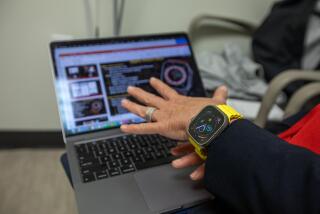Orange County Focus is dedicated on Monday to analysis of community news, a look at what’s ahead and the voices of local people. : He’ll Never Get Better--but Doctors Will
- Share via
Harvey is no dummy.
The $115,000 medical manikin with the baby-blue eyes can simulate about 30 cardiovascular diseases as the first cardiology training simulator of its kind in the state.
Harvey gives UC Irvine medical school students the opportunity to learn how to recognize an array of heart-related problems, which normally could take years of on-the-job experience to encounter.
Medical educators say patient simulation is the wave of the future.
“If tomorrow you take a trip to New York City and the pilot comes out of the cockpit and says, ‘Don’t worry about it, I just passed my multiple-choice questionnaire and I did very well,’ that is not going to reassure you,” said Dr. Alberto Manetta, a senior associate dean at the UCI College of Medicine.
“You would like that pilot to be in a simulator, putting in a lot of hours under many different conditions. We expect the same thing to be applied to medicine.”
Harvey was unveiled Monday during open-house ceremonies at the medical school’s new $1-million Medical Education Center, a renovated building that previously housed the campus biomedical library.
There are only about 30 similar cardiovascular simulators in the United States, according to Robert Wesley, assistant dean of medical education at UCI.
Harvey, created by the University of Miami School of Medicine, is connected to a computer that trains and tests students.
A system of belts, pulleys, pumps and microchips simulates a variety of heart problems that can be monitored through infrared, remote-control stethoscopes and from computer-generated electrocardiograms.
Harvey’s lifelike skin is clammy to the touch, his legless torso appears to breathe and his pulse can be felt at various points on his body.
While Harvey got most of the attention Monday afternoon, the focus of the new center is on training medical students in the art of interacting with human patients, a growing area of medical education frequently overlooked in prior years, according to Ellen M. Lewis, director of the medical school’s Student Education Center.
“It was less structured and more haphazard in terms of opportunities to learn certain things,” Lewis said.
The National Board of Medical Examiners, the licensing agency for physicians, is considering using the new UCI facility as a regional testing center.
Lewis said the National Board, which currently requires only written exams for medical licensing, is expected to mandate clinical tests in a few years.
More to Read
Sign up for Essential California
The most important California stories and recommendations in your inbox every morning.
You may occasionally receive promotional content from the Los Angeles Times.













